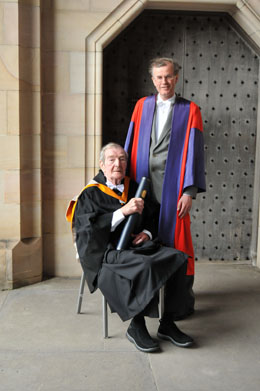Laureation address – Alastair Reid
Alastair Reid
Honorary Degree of Doctor of Letters
Laureation by Professor Robert Crawford
School of English
Thursday 23 June 2011

Chancellor, Principal, Distinguished Guests and Friends, I have the honour to present the poet Alastair Reid for the degree of Doctor of Letters, honoris causa.
Poet, essayist, translator, man of letters, Alastair Reid was born at Whithorn in rural south-west Scotland in 1926. His was a bilingual Galloway childhood: the Scots tongue in the playground, the English language when he entered the classroom. His father, ‘very involved in language and reading’, was the local minister; his mother, sometimes paid in potatoes and eggs, was the doctor. Alastair Reid’s was an infancy spent in what he has recalled as an idyllic ‘agricultural eternity’; he remembers being ‘intrigued by the tinkers who used to come from Ireland to Scotland for seasonal labour. They always came by our house next to the church, and my parents would give them old clothes and a sandwich. They had a little cart with a dog tied to the back, in which they went over the hill to find more work. I used to ask my father, ‘Where are they going?’ And he would say, ‘Well, they don’t know.’ And I thought: these people just move all the time. How exciting.’
Alastair Reid’s early adult excitements were in wartime; he saw service with the Royal Navy during World War II. But one of his most important forays was to come here, to this university. He arrived as a student, left ‘after a brief first year’ to join the Navy, and, as he put it, by the time he got back, after the end of the Second World War, he ‘had seen the Mediterranean, the Red Sea, the Indian Ocean, and enough ports of call, enough human variety, to make St Andrews seem small and querulous.’ That last word suggests a certain scratchiness in Reid’s relationship with this ‘bookish’ small town. Yet he has written about it better than anyone else, seeing it as ‘a singular place, with an aura all its own … unfailingly beautiful to behold in any weather’, as well as presenting in his poetry – Reid studied English here – ‘the thin librarian’s look of hate’ and ‘the small, damp-browed professor’.
Alastair Reid’s best known poem, originally entitled ‘St Andrews’ but retitled ‘Scotland’, has been anthologized so often that its restless author (recreating an older St Andrews tradition) subjected it to a public burning after reading it at the StAnza poetry festival some years ago. Having graduated from St Andrews, Reid adopted ‘not rootlessness, since that implies a lack, a degree of unanchored attention, but a deliberate, chosen strangeness.’ He spent time both in Spain and in the United States, beginning to write for the New Yorker magazine in 1951, when he taught at Sarah Lawrence College. He also immersed himself in rural Spain, and spent time with Robert Graves on Mallorca, admiring Graves’s sense of the poet as a guardian of the language, a ‘clarifier’. Writing Reid regards as ‘about the most portable profession there is’; and he loved working for the New Yorker for over four decades because it treated its writers well, at the same time knowing how to leave them ‘unencumbered’. In 1964 he made a ‘pilgrimage’ to that continent, meeting writers whose work he admired – in particular Jorge Luis Borges in Argentina and Pablo Neruda in Chile. He began to translate their poetry, and is regarded by many as the finest translator of their verse.
Alastair Reid enjoys becoming another person in another language; he regards other languages as ‘different pieces of clothing’. Attired in several, he has divided his time between New York City, the Latin American continent and the coast of Galloway. He once described himself as ‘portable, to the tune of two small bags.’ But what has been constant is the pitch-perfect assurance of his writing. Not just his hundreds of mica-fine New Yorker essays, but also his own poems with their deft encapsulations and questions,
For who is weather-wise
enough to recognize
which ills are the day’s, which his? (45)
and his translations (as here of Borges) which sound so idiomatic that they might have been English-language originals:
The evening’s rain
brings me the voice, the dear voice of my father,
who comes back now, who never has been dead.
Alastair Reid has published more than forty books and has read or spoken across the globe, from Yale to Edinburgh, from Chile to London. His selected writings – two volumes entitled with characteristic elegance Inside Out and Outside In – were published in 2008. He is an international treasure, much honoured. In a few days he will receive an honorary degree from the University of Glasgow’s Crichton Campus, not so far from Whithorn where he was born. Here today we may be thankful that, somewhat belatedly and just with a few days to spare, his alma mater got there first.
Chancellor, I invite you to confer on Alastair Reid the degree of Doctor of Letters, honoris causa.
Category Awards